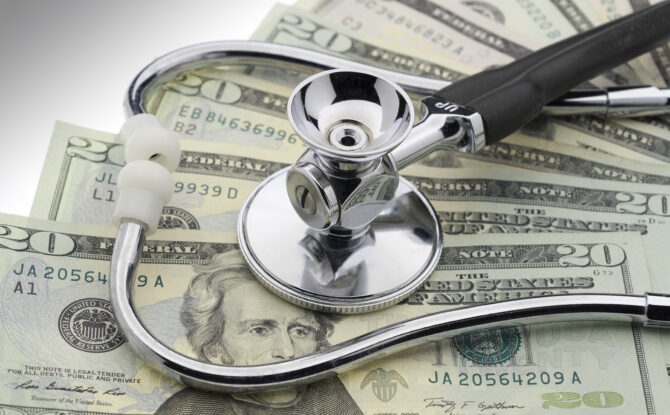
Healthy Spending: Eating, Moving, & Saving
We all know that living an unhealthy lifestyle— eating junk food, smoking cigarettes, or being sedentary—can have major physical consequences. However, an unhealthy lifestyle can also have financial ramifications. Even though some people associate being healthy with expensive gym memberships or organic produce, a healthy lifestyle doesn’t have to mean an empty wallet. In fact, realigning your diet and exercise can pay off in the short and long term.
Healthy bodies come in all shapes and sizes, but carrying too much excess weight can increase healthcare expenses over time. It’s important to maintain a healthy weight and eat nutritious food for both your body and your bank account. For example, a 40-year-old who goes from obese to a healthy weight saves on average $28,020 in future healthcare expenses. This is because losing weight decreases the risk of diabetes, high blood pressure, stress on joints, and other maladies, resulting in less doctor visits and prescription medications. Dining out too much also contributes to an unhealthy weight, so by limiting restaurant visits and instead preparing fresh food at home, you can save money, pounds, and the cost of future medical bills. Similarly, quitting smoking and limiting alcohol intake contribute to better financial and physical health.
Though diet determines much of our physical health, exercise is important too. Not only does exercise positively affect the mind and body, but it can save you money. Research from the American Heart Association shows that patients who regularly exercised paid on average $2,500 less in medical costs. Additionally, exercise can improve sleep, reduce headaches, and boost the immune system, allowing you to cut down on both over-the-counter and prescription meds. Exercise increases energy levels and boosts mood, making you less likely to depend on unhealthy, costly vices. Embracing an active lifestyle can also decrease transportation costs; instead of driving to your destination, consider biking or walking. Though sometimes exercise feels like work, it’s work that always pays off.
Committing to a healthy lifestyle is a great way to ensure that you get the most out of your life and your money. Healthy living and spending are all about balance. According to certified financial planner Carol Craigie:
“If you limit your calories but it’s all chocolate and ice cream, then you’re not going to be healthy. And if you limit your spending but it’s all on stuff and not saving for the future, you’re not going to be (financially) healthy.”
Carol Craigie, CFP
Sources:
- “5 Reasons Why A Healthy Lifestyle Will Save You Money.” Lifehack, Lifehack, 3 Dec. 2012, www.lifehack.org/articles/lifestyle/5-reasons-why-a-healthy-lifestyle-will-save-you-money.html.
- Egan, John. “4 Ways That Healthy Living Can Put Money in Your Pocket.” Vitacost, Vitacost, 20 Sept. 2016, www.vitacost.com/blog/food-nutrition/nutrition/4-ways-that-healthy-living-can-put-money-in-your-pocket.html.
- Goldberg, Matthew. “How Investing In Your Health Can Save You Money.” Bankrate, Bankrate.com, 25 Sept. 2018, www.bankrate.com/banking/savings/healthier-lifestyle-can-save-you-money/.
- Summar, Todd. “5 Lifestyle Changes That Will Save You Money—And Make You Healthier.” Discover Bank – Banking Topics Blog, Discover Bank, 4 Dec. 2018, www.discover.com/online-banking/banking-topics/5-lifestyle-changes-to-make-save-more-money/.



